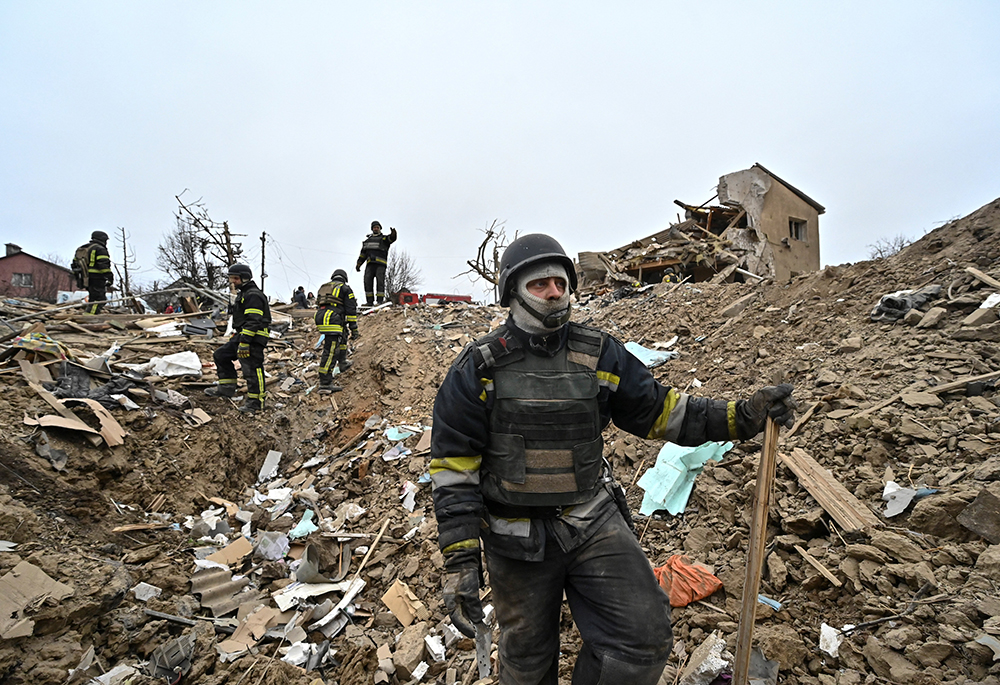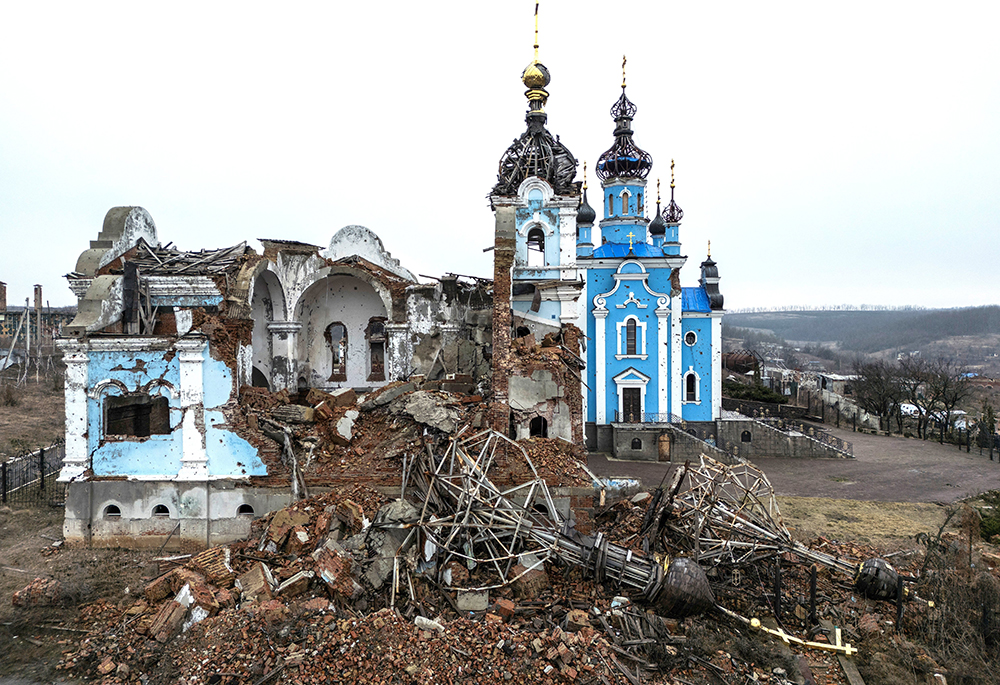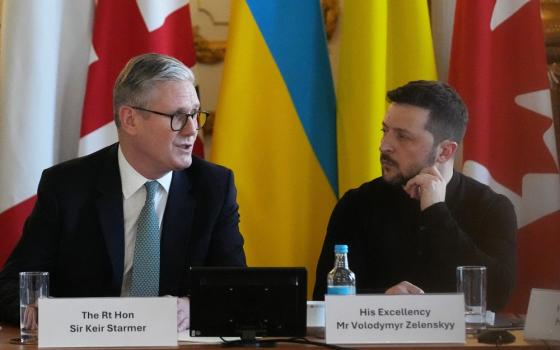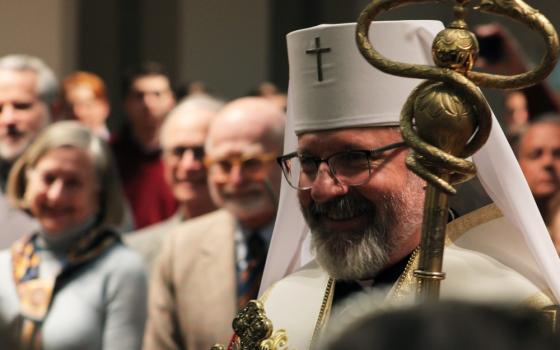
A first responder works at a site of residential buildings destroyed by a Russian airstrike in Zaporizhzhia, Ukraine, March 22, 2024. (OSV News/Reuters)
I'm going back to Ukraine. I was there last year in 2023.
On the surface it makes no sense for me to go. I'm not a diplomat or government official. I'm not a military man or an important journalist. I'm not representing a charity or NGO or media organization. I am just an ordinary person. So why go to a war-torn country? Won't I just be in the way? What difference can a 73-year-old retired priest make anyway?
I am going to "bear witness" to the suffering of the Ukrainian people and to their courage. I am going to bring attention to their cause and its moral rectitude. I am going because I feel the need to do something, even if small, to help those courageous people survive this unjust war and continue to exist as a nation.
The business of "bearing witness" is not a novel idea. Many priests and religious and social activists did just that in Central America during the 1980s and 1990s. Many people went to El Salvador, Nicaragua, Honduras and Guatemala, to bear witness to what American foreign policy was doing there and to try to get the policy changed. There is a long history of ordinary people going to conflict zones to see firsthand what is actually going on there and to come home to the U.S., the world's most powerful nation, and tell the story here.
I am not going alone. We are a group of five people.
Our leader and organizer is former Congressman David Bonior of Michigan who was for many years the Democratic whip in the U.S. House of Representatives. The group also includes Emily Rutkowski, a Michigander now living in Kyiv who leads a small nongovernmental organization called Misha's Angels that brings help to Ukrainian soldiers on the front and their families. Dr. Eric Trupin, a psychiatrist from Seattle who specializes in trauma, is also part of our group. He will help us evaluate mental health services in Ukraine. Our group includes Robert Wood, a professor at Ukrainian Catholic University in Lviv. He will allow us to talk with the students in his classes and get a sampling of their views on the war. Also with us is Brian Brady, a community organizer (Mikva Challenge) and videographer from Evanston, Illinois, who will produce a video diary of our visits to various people and cities in Ukraine.

A church destroyed by a Russian attack on the village of Bohorodychne in Ukraine's Donetsk region is pictured Feb. 13, 2024. (OSV News/Reuters/Vladyslav Musiienko)
In 2023, we went to listen to refugees and displaced persons in Ukraine and Poland. We wanted to hear their stories and the stories of the people helping them, especially Catholic charities, priests and religious and lay organizations. We wanted to promote and encourage their work.
In 2024, our focus will shift to trauma and the suffering of the Ukrainian people and their emotional and spiritual reliance. Again, we want to hear their stories, and by telling their stories back home in the U.S., to help them in their situation.
Virtually everyone in Ukraine has been traumatized by the war in some way. They have been fighting Russia for 10 years, since 2014. We Americans only really focused on the war in February 2022, when Russian President Vladimir Putin launched his full-scale invasion.
The trauma figures are staggering for a country of about 40 million people. Thirty-one thousand Ukrainian soldiers have been killed since 2022, according to the government announcement made on Feb. 24, 2024. Tens of thousands of soldiers and civilians have been wounded. A minimum of 20,000 children have been kidnapped and taken illegally into Russia (the actual figures are likely many times that). Whole cities, like Mariupol, have been leveled and abandoned. Over six million people have fled the country as refugees, mostly in Europe. Eight million people have been internally displaced.
On our trip, we will meet soldiers who have been injured and some who have post-traumatic stress disorder. We will meet with religious leaders, Catholic and Orthodox, evangelicals and others, who are trying to minister to their damaged communities and hold their people together.
According to a report from Heal Ukraine Trauma, up to 15 million people (about one-third of all Ukrainians) will need mental health support as a result of Russia's invasion. That is an incredibly high percentage, probably exceeded only by the traumatized people of Gaza.
Advertisement
We are paying our own way to Ukraine. Our goal is not to make money or raise money. Our goal is to listen to the people there and tell their story to anyone who will listen. The grassroots matter. What ordinary people do and say can matter. Great social movements begin at the bottom of society and swell upward. Not the other way around. So, our voices matter.
Consider how Christianity started after the Resurrection. Our Lord had only 11 apostles and several dozen other disciples. Like them we step out in faith. Bearing witness is like the work of evangelization. We are firsthand witnesses to a great and unjust suffering in our time. We need to take note of what is going on and redress the wrong.
Two years into the full-scale war, I think the Ukrainians have acted both courageously and responsibly. Their cause of self-defense and self-preservation is just. Their actions have been proportional and focused on legitimate targets.
But they need our help. If they lose, we lose. Democracy loses. A murderous dictator like Putin wins. A genocide will take place and a nation will be erased from the independent nations of the earth.
If they win, they win for us all.
So, I am going back to Ukraine. Maybe it makes no sense. But I feel compelled to go and bear witness to their cause and their suffering.






